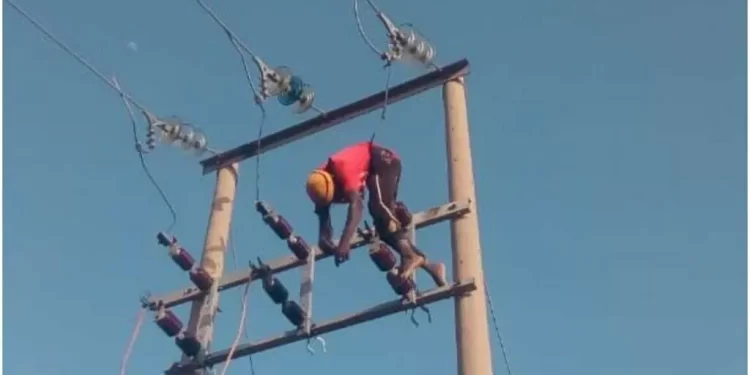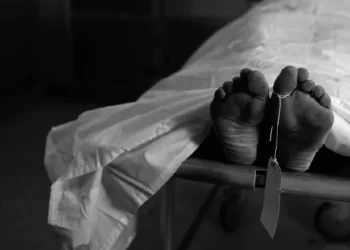A heartbreaking incident in Ghana’s Eastern Region, as published by ghanaweb earlier today has claimed the life of a Senior High School (SHS) student who was electrocuted during an industrial attachment.
The student, identified as 19-year-old Kofi Asare, was a second-year student from a technical school in Koforidua, undertaking a mandatory attachment program at a small-scale metal fabrication workshop in the Akyem Oda municipality.
According to eyewitness accounts, the tragedy occurred when Kofi attempted to operate a welding machine without realizing that an electrical fault had left exposed live wires on the equipment.
Colleagues at the workshop reported hearing a loud scream before finding Kofi lying motionless on the floor. Despite efforts to revive him, the young man was pronounced dead upon arrival at the Akyem Oda Government Hospital.
The owner of the workshop, visibly shaken by the incident, expressed regret over the tragedy but admitted that the equipment had shown signs of electrical issues in the past.
“We always used the machine carefully, but we never thought something like this could happen,” he said.
This incident has sparked concerns about safety measures for students placed in industrial environments. Critics argue that most workshops lack the necessary safety protocols, exposing students to life-threatening risks.
The Ghana Education Service (GES) mandates that all industrial partners ensure safe working conditions for students, but implementation and enforcement remain challenges.
In response to the tragedy, the Eastern Regional Director of Education, Mrs. Diana Ankomah, extended condolences to the bereaved family and assured the public that an investigation would be launched.
“We will ensure such negligence does not go unpunished, and we will also review our attachment policies to prioritize student safety,” she said.
The incident has drawn widespread attention, with advocacy groups calling for stricter workplace regulations.
Many believe that workshops and companies should undergo periodic inspections before being approved to host students.
Kofi Asare’s family is devastated by the loss. His father, visibly grief-stricken, called for justice and accountability. “We trusted the system to protect our son. He went there to learn, not to die,” he lamented.
A heartbreaking incident in Ghana’s Eastern Region, as published by ghanaweb earlier today has claimed the life of a Senior High School (SHS) student who was electrocuted during an industrial attachment.
The student, identified as 19-year-old Kofi Asare, was a second-year student from a technical school in Koforidua, undertaking a mandatory attachment program at a small-scale metal fabrication workshop in the Akyem Oda municipality.
According to eyewitness accounts, the tragedy occurred when Kofi attempted to operate a welding machine without realizing that an electrical fault had left exposed live wires on the equipment.
Colleagues at the workshop reported hearing a loud scream before finding Kofi lying motionless on the floor. Despite efforts to revive him, the young man was pronounced dead upon arrival at the Akyem Oda Government Hospital.
The owner of the workshop, visibly shaken by the incident, expressed regret over the tragedy but admitted that the equipment had shown signs of electrical issues in the past.
“We always used the machine carefully, but we never thought something like this could happen,” he said.
This incident has sparked concerns about safety measures for students placed in industrial environments. Critics argue that most workshops lack the necessary safety protocols, exposing students to life-threatening risks.
The Ghana Education Service (GES) mandates that all industrial partners ensure safe working conditions for students, but implementation and enforcement remain challenges.
In response to the tragedy, the Eastern Regional Director of Education, Mrs. Diana Ankomah, extended condolences to the bereaved family and assured the public that an investigation would be launched.
“We will ensure such negligence does not go unpunished, and we will also review our attachment policies to prioritize student safety,” she said.
The incident has drawn widespread attention, with advocacy groups calling for stricter workplace regulations.
Many believe that workshops and companies should undergo periodic inspections before being approved to host students.
Kofi Asare’s family is devastated by the loss. His father, visibly grief-stricken, called for justice and accountability. “We trusted the system to protect our son. He went there to learn, not to die,” he lamented.
A heartbreaking incident in Ghana’s Eastern Region, as published by ghanaweb earlier today has claimed the life of a Senior High School (SHS) student who was electrocuted during an industrial attachment.
The student, identified as 19-year-old Kofi Asare, was a second-year student from a technical school in Koforidua, undertaking a mandatory attachment program at a small-scale metal fabrication workshop in the Akyem Oda municipality.
According to eyewitness accounts, the tragedy occurred when Kofi attempted to operate a welding machine without realizing that an electrical fault had left exposed live wires on the equipment.
Colleagues at the workshop reported hearing a loud scream before finding Kofi lying motionless on the floor. Despite efforts to revive him, the young man was pronounced dead upon arrival at the Akyem Oda Government Hospital.
The owner of the workshop, visibly shaken by the incident, expressed regret over the tragedy but admitted that the equipment had shown signs of electrical issues in the past.
“We always used the machine carefully, but we never thought something like this could happen,” he said.
This incident has sparked concerns about safety measures for students placed in industrial environments. Critics argue that most workshops lack the necessary safety protocols, exposing students to life-threatening risks.
The Ghana Education Service (GES) mandates that all industrial partners ensure safe working conditions for students, but implementation and enforcement remain challenges.
In response to the tragedy, the Eastern Regional Director of Education, Mrs. Diana Ankomah, extended condolences to the bereaved family and assured the public that an investigation would be launched.
“We will ensure such negligence does not go unpunished, and we will also review our attachment policies to prioritize student safety,” she said.
The incident has drawn widespread attention, with advocacy groups calling for stricter workplace regulations.
Many believe that workshops and companies should undergo periodic inspections before being approved to host students.
Kofi Asare’s family is devastated by the loss. His father, visibly grief-stricken, called for justice and accountability. “We trusted the system to protect our son. He went there to learn, not to die,” he lamented.
A heartbreaking incident in Ghana’s Eastern Region, as published by ghanaweb earlier today has claimed the life of a Senior High School (SHS) student who was electrocuted during an industrial attachment.
The student, identified as 19-year-old Kofi Asare, was a second-year student from a technical school in Koforidua, undertaking a mandatory attachment program at a small-scale metal fabrication workshop in the Akyem Oda municipality.
According to eyewitness accounts, the tragedy occurred when Kofi attempted to operate a welding machine without realizing that an electrical fault had left exposed live wires on the equipment.
Colleagues at the workshop reported hearing a loud scream before finding Kofi lying motionless on the floor. Despite efforts to revive him, the young man was pronounced dead upon arrival at the Akyem Oda Government Hospital.
The owner of the workshop, visibly shaken by the incident, expressed regret over the tragedy but admitted that the equipment had shown signs of electrical issues in the past.
“We always used the machine carefully, but we never thought something like this could happen,” he said.
This incident has sparked concerns about safety measures for students placed in industrial environments. Critics argue that most workshops lack the necessary safety protocols, exposing students to life-threatening risks.
The Ghana Education Service (GES) mandates that all industrial partners ensure safe working conditions for students, but implementation and enforcement remain challenges.
In response to the tragedy, the Eastern Regional Director of Education, Mrs. Diana Ankomah, extended condolences to the bereaved family and assured the public that an investigation would be launched.
“We will ensure such negligence does not go unpunished, and we will also review our attachment policies to prioritize student safety,” she said.
The incident has drawn widespread attention, with advocacy groups calling for stricter workplace regulations.
Many believe that workshops and companies should undergo periodic inspections before being approved to host students.
Kofi Asare’s family is devastated by the loss. His father, visibly grief-stricken, called for justice and accountability. “We trusted the system to protect our son. He went there to learn, not to die,” he lamented.










Discussion about this post